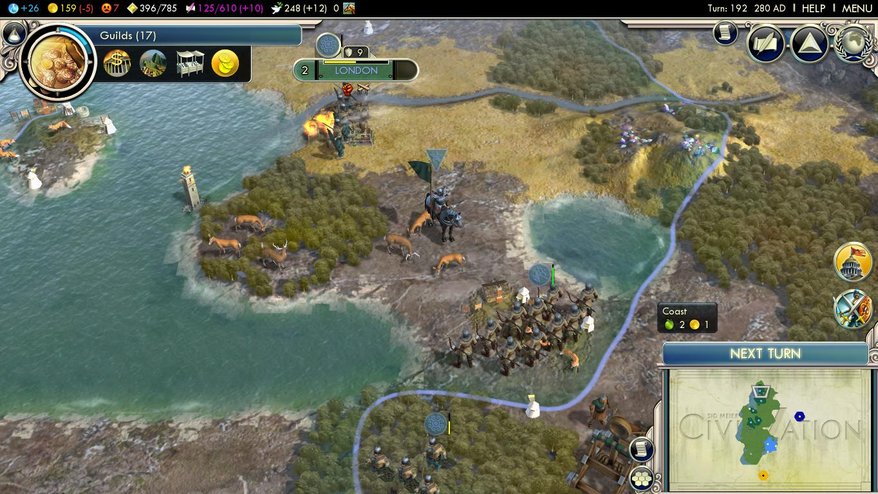
Righteous conquest and the promise of a more civilized age
280 A.D.: The siege has taken its toll, and many Picts are lost, but London is finally captured. The godless, defunct English royalty are put to the sword, and the Londoners are given a provisional seat on the Celtic Senate.
The general who led the attack to take the city is elected the first King of the Celts and the English, acting as an executive and figurehead for the Republic's government. He expresses his wishes in a speech in London Square: that his line will rule over a peaceful Celtica in the sight of the holy PC.
So I'm taking some creative license here. No, I didn't expend my Great General for some kind of political bonus, nor did I adopt monarchy. But it adds some flavor to the story. After all, we're heading into the Middle Ages soon, and "Having Kings" is one of the main activities associated with that time period.
In terms of strategy, I'm done conquering for a good, long while. Bringing England into my fold has brought me riches and prestige, and at this point I'm pretty happy with the lands I have. I've played too many a game where I keep fighting until my sprawling empire is divided, spread thin, and clunky to manage. Celtica will, from here on, grow slowly inland from the northwest coast of the continent by settlement of new cities--and only when needed.
295 A.D.: Many Englishmen, particularly Londoners, are still resentful of Celtic rule. Construction begins on a number of fighting arenas to provide entertainment and let them take out their frustrations.
Even having allowed the English cities I conquered to retain local rule, the clash of cultures has put me into the negative on Happiness. Building circuses and colosseums is the fastest way to remedy this.
340 A.D.: PC Elitist missionaries from Cardiff set out for Sweden. The Celts and the Swedes agree to an Open Borders pact, allowing the missionaries to travel freely and preach within Swedish lands.
Keep up to date with the most important stories and the best deals, as picked by the PC Gamer team.
370 A.D.: The Swedes and the Celts make a formal declaration of friendship.
Len Hafer is a freelancer and lifelong PC gamer with a specialty in strategy, RPGs, horror, and survival games. A chance encounter with Warcraft 2: Tides of Darkness changed her life forever. Today, her favorites include the grand strategy games from Paradox Interactive like Crusader Kings and Europa Universalis, and thought-provoking, story-rich RPGs like Persona 5 and Disco Elysium. She also loves history, hiking in the mountains of Colorado, and heavy metal music.

